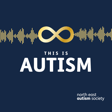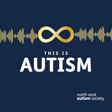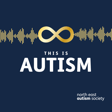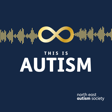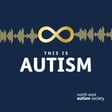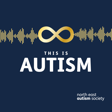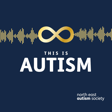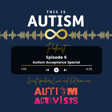Become a Creator today!Start creating today - Share your story with the world!
Start for free
00:00:00
00:00:01

5. Sexual and gender identity
Anecdotally, we've known for a while that autistic people are more likely to identify as LGBTQIA+ than non-autistic people, and research is now beginning to support this. This episode will explore the intersection between autistic and LGBTQIA+ identities, looking at the issues facing autistic people as they explore their sexuality and gender identity.
Erin Ekins talks to our Family Development Manager Kerrie Highcock about her personal journey as a queer autistic person, and what professionals and parents can do to support autistic people on their journey.
Music: Aukestra
Transcript
Creating Safe Spaces for Gender Exploration
00:00:08
Speaker
your child or your loved one, they need to know that you're a safe place that they can fall. You kind of see a synergy within the masking as being an autistic person and the masking around your gender identity. Really kind of similar sensations, similar feelings, similar difficulties, and it has a similar negative impact on you long term.
00:00:36
Speaker
but I think affirming sexuality and gender identity is really important, even if it's been six months and this is the fifth identity they've come to you with. I tried clubbing, I tried going out on the gay scene, really struggled with it. Clubs are not necessarily autism friendly.
Introducing 'This is Autism' Podcast with Kerry Highcock
00:00:56
Speaker
Hello and welcome to a new episode of This is Autism, a podcast from the Northeast Autism Society. My name is Kerry Highcock and I'm the Family Development Manager at the charity.
Intersection of Autism, Sexuality, and Gender Identity
00:01:06
Speaker
Did you know that more than one third of autistic people identify as LGBT plus? We wanted to explore the intersection between autism, sexuality, and gender identity ahead of Autistic Pride Day on Sunday, June the 18th.
Meet Erin Eakins: Queer Autistic Advocate
00:01:18
Speaker
Here to help us do that is our guest, Erin Eakins, the queer autistic writer and speaker behind the website, Queerly Autistic, and the book of the same name, aimed at LGBTQIA plus autistic teens.
00:01:32
Speaker
So Erin, can you tell us a little bit about yourself and why you really started Queerly Autistic? Of course I can. So yeah, I am a queer autistic writer and speaker.
00:01:49
Speaker
Twitter user, a tempter of activism. I don't like to say activist. It feels like it comes with a lot of pressure and maybe a little bit of self-importance. So I like to say I attempt activism in my spare time.
00:02:04
Speaker
And I started Queerly Autistic mainly because I needed an outlet to talk about things. I got my diagnosis when I was 23 and it was a whole new world for me to explore and I've always enjoyed writing. So it just came about one day that I thought, you know what, I'll put this together and I'll start writing about this. I'll start
00:02:28
Speaker
putting my thoughts down and thinking about certain topics and exploring it as much as it was about connecting with other people and talking about what I believed and my opinions on certain topics. It was also really important in terms of figuring myself out now as someone who'd been out for a few years as queer but now I had this whole other identity as well and you know it's
00:02:52
Speaker
it reshaped my life, so having that outlook was really important and it seemed to connect with people.
Erin's Writing Journey and Book Deal
00:03:01
Speaker
And off the back of that, it sort of spiralled a little bit. I accidentally ended up with a book deal. I don't know how that happened. But I ended up writing this book that I'm really, really proud of. And it's, yes, it's all spiralled from there. And I've got to meet the most amazing people and interact with the most amazing people and find a community.
00:03:22
Speaker
that I didn't have before. So it's been, it's been quite a journey the last eight, eight years, eight years since my diagnosis. Yeah. Yeah. And I imagine there's lots of autistic people out there that are, you know, perhaps on the same journey or starting out on that journey. So what was that really like for you, Erin? You know, what was, what did it feel like I supposed to be able to work through and figure out, you know, your own identity?
00:03:48
Speaker
Well, it's a long old journey, isn't it? I don't think you ever quite reached the destination. I think it's one of those things you go on your whole life, but you can get a bit closer to it and a bit more comfortable with it. So my journey with realising I was queer started very, very young. I think my earliest
00:04:10
Speaker
memory of it was when I was 12. I remember, well I don't remember, but I was looking through diaries a few years ago and I found this entry from when I was 12 and there's this whole, the most angsty entry I've ever read in my life where I'm going, I think I have a crush on my teacher, oh my goodness this means I'm gay, I'm so stressed about this, what does this mean, I'm very confused.
00:04:33
Speaker
And then like the very next day was a very calm sort of, stop being silly Erin entry that was like, you've got posters of Legolas up on your wall. You can't be gay. This is very silly. What are you talking about?
00:04:46
Speaker
And it wasn't until I was 16 and I saw a bisexual character on TV that I was like, oh, that's a thing. That's the thing. There's a name for this and this is a thing and I can be this. So there's been that was a couple of years there where it was quite difficult because I didn't have the cultural framework to interpret what I was feeling. I remember when I was when I was in secondary school, one of my teachers figured it out before I did.
00:05:16
Speaker
and figured out that there was stuff going on with my sexuality, with my identity. I'd call in and I'd have meetings with her and I'd be bawling my eyes out because I was so stressed and upset and I didn't understand why. I remember she'd pepper her desk with leaflets and
00:05:33
Speaker
because I was autistic didn't know I was autistic I was very kind of I didn't notice them because I wasn't expecting them to be there and I was very focused and so I never I never picked up one of the leaflets and it wasn't until a few years later that I bumped into her outside of school that she told me that that's what
00:05:49
Speaker
That's what she'd done. And that was the joy of also living in a post Section 28 world. You know, Section 28 was repealed when I was 11, but I would hear I was 16 and the teachers were still too scared to broach the subject with me. So there were ripples to that legislation. No, sorry, Erin, I was just wondering just for our listeners, could you just clarify what Section 28 means?
Impact of Section 28 on LGBTQ+ Education
00:06:13
Speaker
Yes, so Section 28, it was a law that was passed in the 80s, I can't remember the exact date, but it was passed in the 80s and it basically prohibited the quote unquote promotion of homosexuality. Basically meant that teachers weren't allowed to talk about it, people who were in positions of authority or had any contact or responsibility over children weren't allowed to talk about it, but included like scout leaders, guide leaders,
00:06:41
Speaker
basically stopped kids from being able to learn about anything other than being straight for nearly
00:06:48
Speaker
almost 20 years. Okay, I had never heard of that before. Okay, yes, it was it was repealed in 2003. Obviously, then you have by then you had a whole generation of teachers who'd grown up scared to talk about this. So I come across several instances when I was at school after 2003, where teachers wouldn't talk about it, or teachers were afraid to talk about it. When I was, I think, 20, or maybe 1920.
00:07:17
Speaker
I got in touch with my secondary school because I was, by that point, active in the LGBT association. And I asked them if I could come back and deliver a talk because it would have been really useful when I was at school. And they said, OK, we will let you do this, but here's a very prescriptive list of what you can and can't talk about. And I didn't feel like I could deliver what I wanted to say with that very prescriptive list.
00:07:41
Speaker
So it was still going on even after I left. My old secondary school now is, I'm very proud of them because they are apparently one of the most LGBTQ plus
00:07:52
Speaker
kind of accepting schools in the country now. There've been articles written about them and that change happened because the students formed a queer-straight alliance and demanded change and forced the school to change. So I think about my time there where you'd get told off if you were holding hands with another girl. It was an all-girls school. And now I look at them getting articles written about them because the students stood up and said, no, you need to be better than this. So it's been really, that's been quite
00:08:23
Speaker
quite heartwarming and the students have that amount of impact.
Challenges in LGBTQ+ Spaces for Autistic Individuals
00:08:29
Speaker
So yeah, by the time I got to university, I was then, I tried clubbing. I tried going out on the gay scene, really struggled with it. Clubs are not necessarily autism friendly. So instead I focused on politics. I did some advocacy roles while I was at uni. I took on some officer roles in the LGBT plus association.
00:08:52
Speaker
And then when I was 23, I got my autism diagnosis, and that added a whole other layer and kind of lens through which to see everything and to understand everything. And I've sort of been figuring it out from that point on, these are, and I have these two really important facets of my identity, how they kind of interweave with each other. And I'm still on that journey. I'm still, you know, I identify as cis, but writing the book has, and talking about things,
00:09:21
Speaker
made me interrogate my gender in different ways. I have a really interesting relationship with my gender now. As I say, I still identify as cis, but there's just a really kind of, it's been a really exciting journey to be on actually. So it's been a long trip and I think it's continuing, but it's continuing at a place where I'm currently incredibly comfortable and kind of I have a degree of pride and
00:09:50
Speaker
and acceptance in myself that I didn't have for a really long time. That's really, really lovely to hear, Erin, I suppose, because if we think about the research around autistic masking and leading to burnout and suicidality and all of these really negative poor outcomes for autistic people. I'm just interested in, do you see a synergy within the masking
00:10:14
Speaker
as being an autistic person and the masking around your gender identity, do you see kind of correlations between the two? Oh, huge amounts. Huge amounts. I think it's, I often draw, obviously it's not exactly the same, but there's real kind of commonalities in the act of masking and hiding who you are and being in the closet.
00:10:40
Speaker
It's really similar feelings because obviously I've experienced both and really kind of similar sensations, similar feelings, similar difficulties and it has a similar negative impact on you long term.
00:10:56
Speaker
So yeah, I think there is kind of a big, there's a big overlap in terms of, and also how you code switch when you're with people you're comfortable with. I'm so much more autistic, quote unquote, around people that I know are gonna be safe to be very autistic around, whereas I do still mask around in work situations or situations where I've maybe not comfortable.
00:11:22
Speaker
And it's the same with my queerness. If I'm not sure that I'm safe in a situation, I will pretend I won't talk about it. I'll
00:11:35
Speaker
it would be slightly different to how I am if I'm in a space where I know I'm safe. Of course. Yeah. And I think that's one of the big things, isn't it? You know, sexuality and being autistic or having disabilities are all marginalised groups and all open to being bullied. And, you know, that's where that masking comes in. It's a protection, isn't it, on many levels. It's a safety mechanism. So I can kind of see that perhaps somebody who is autistic and also has
00:12:02
Speaker
gender or sexuality differences that there kind of would be multiple layers of masking to kind of peel back and work through to get to the point where you can actually you know say I'm Aaron and this is who I am and a lot of that is about societal attitudes isn't it and prejudices and all of that that we talk about. And pressure as well I think. Pressure and safety and you know I think
00:12:29
Speaker
as much as I wish we lived in a world where we could unmask all the time, we don't live in that world. And, you know, and it's when I was writing my book, that was something I had to I had to actually to talk about, which was say to people, obviously, the ideal is that you come out and you be who you are. But if you're a young person and it's not safe for you to do that, then you might have to stay in the closet for a bit until you're in a safer situation because your safety comes first.
00:12:55
Speaker
That's really hard because you want to spread a message of be yourself but you also want people to be safe and if they need to code switch in a situation to be and to mask in a situation to be safe then that's
00:13:09
Speaker
that's kind of the dilemma you come across. Yeah and I mean I always talk about particularly with my young people that I work with about finding your tribe, finding your people you know and do you think that the community, the queer community is accessible for autistic people or do we have a lot more work to do? I think a lot more work to do. I think that's true of actually every community. I think
00:13:37
Speaker
most communities have work to do when it comes to general accessibility. I think the queer community, I think there's a real and really wonderful, you know, I'm not in any way disparaging this. There's a really wonderful history in the queer community of spaces like nightclubs and pubs, being safe spaces. And I love that part of our history. I love learning about that part of our history. I just can't
00:14:04
Speaker
partaking it. And I have really tried to go to gay bars and it's just too much stimulation for me. It's too loud. It's too bright. I get very overwhelmed. I have to leave. I almost had a meltdown in a club once which wasn't the best thing to happen.
00:14:25
Speaker
So while we have those spaces and I think those spaces need to be preserved and they need to be continued, I think we also need maybe more accessible spaces. We need maybe some quieter spaces. We need kind of, you know, maybe some space as well without alcohol. So I think we have to just widen the type of space that we have. I also think just
00:14:50
Speaker
Generally, same with things like pride. Prides need quiet spaces, need kind of places to get away. I don't go to big pride parades because I know I can't handle them. I will go to smaller pride parades instead, like more local ones. And then you just have, obviously, there are people in the queer community who don't understand
00:15:14
Speaker
being autistic as well as you get everywhere. So you experience that
Accessibility Issues in Queer Communities
00:15:21
Speaker
prejudice and you experience queerphobia and transphobia in the autistic community as well for the same reason. If you're not part of that marginalised group then you have the societal prejudice you've grown up with.
00:15:36
Speaker
There's a lot of angles that needs to be worked on in terms of being accessible to autistic people. I think LGBT plus spaces are getting better, but we need people running youth groups to be aware that they may have neurodivergent people in there. They likely will have neurodivergent people that they're looking after. We need to make sure that
00:16:02
Speaker
LGBT plus affirming care that's provided people is also autism informed and neurodivergent informed. There's a lot of work to do. I think it's getting better. I've requested quiet spaces at Pride and actually had them happen, which is better than it was a couple of years ago.
00:16:22
Speaker
So I think that there is definitely, it's slowly kind of moving forward. I think an issue that you also have with general disability accessibility in queer spaces is that a lot of them are historical, a lot of them are in older buildings that just are
00:16:42
Speaker
inaccessible. My step mum is a wheelchair user and there's a lot of gay bars she can't go to because she's a wheelchair user because the buildings are just not accessible. So there's almost an element of we need to create more accessible spaces and also I think disabled people including autistic people
00:17:02
Speaker
I think we need to be given the resources and support to create our own spaces as well. I think that's really important. Yeah, I would totally agree. And actually, a couple of things you've touched on there, Erin, it's interesting you mentioned nightclubs or nightlife. It's probably, I don't know what the right phrase is, I'm getting too old. But anyway, that stuff you do. I'm working with a well-known nightclub in Newcastle, actually, that was originally set up for marginalized groups for people.
00:17:30
Speaker
from different ethnic backgrounds and it was created as a real safe space for marginalized people to come together and really just hang out and have fun and feel protected and feel like it was okay to be who they are. And it's been really interesting that we started a group with some adolescents, some autistic adolescents and brought them into that space and it's
00:17:53
Speaker
It's interesting that the attitudes and the values that are within that space are absolutely aligned to what we're doing in terms of divergent FMA practice. But actually, you're right, the environment is not autism friendly. It's a dark nightclub with lots of unusual smells and carpeted floors and different gradients across the club. It is really interesting that although we're open and we're welcoming in terms of our attitudes, the environment doesn't actually always match up.
00:18:22
Speaker
I think there is a lot more work to do around just making places a little bit more safer for people, isn't it? Agreed. And not necessarily meaning that you can't have those spaces, just have alternatives as well. And I think it's really important to say as well, obviously, that my experience in not being able to go to gay bars and stuff is not necessarily a universal autistic experience. I have a couple of autistic people that I know who are
00:18:51
Speaker
actually, in some ways, maybe more sensory seeking. So, they actually thrive in a nightclub environment because they're sensory seeking rather than kind of sensitive in that way. So, it's really interesting seeing different autistic people who might need different things, because again, we're not a monolith. So, it's not just one solution will work for all autistic people. Yeah, I agree. We were doing some work around a quiet space, actually, and a couple of the young people said,
00:19:18
Speaker
why are you calling it a quiet space? Actually, when I need to calm down, what I need is quite a lot of stimulus because these young people are quite hyper sensitive. It was just quite an interesting way of looking at things that we don't just strip everything back. There are some people that need actually the big, bright,
00:19:34
Speaker
noisy environments. Absolutely. So I mean, in terms of research, Erin, what evidence is there around the fact that autistic people are more likely to have a fluid sexual or gender identity? What does the research say about all of this stuff? Well, there's actually been quite a lot in recent years, which is really good. I think for a long time, it was mainly anecdotal. It was us saying, well, there's a lot of us.
00:20:05
Speaker
or us going, most of the autistic people are interacting with identifiers LGBTQIA plus in some way. But that's kind of anecdotal and that doesn't translate to resources and support. So having research coming up is really, really powerful. The most recent one that I've seen, I think the third number of the, you know, a third of autistic people, I think that comes from an autistic, not weird survey that was done in 2018.
00:20:35
Speaker
that I think I created in my presentation. I've since been made aware there was another one done last year. I don't know how I missed that. I think I was asleep. You're allowed to sleep. I'm allowed to sleep sometimes. There's an ADHD side of my brain that's been kicking me recently, so I probably completely missed it from that.
00:20:53
Speaker
But there was an Autistic Not Weird survey in 2022, which it was around just over 11,000 respondents, and almost 7,000 of those said they identified as autistic. And that one actually found that just over 55% of respondents there identified, autistic respondents identified LGBT+, so even more
00:21:21
Speaker
and just over 18% ID just trans in that survey and obviously that's not research that's necessarily done by a university so it's maybe not counted by some people but it's a huge data set to have and does point towards something. In terms of sort of like official quote-unquote research there's been more of that kind of
00:21:44
Speaker
going on in recent years and there was a big study by Cambridge University's Autism Research Centre in 2021.
00:21:52
Speaker
which was research into kind of sexual behaviours of autistic people, was just over a thousand autistic people versus just over a thousand non-autistic people between the ages of 16 and 90. So big, broad age range. And they found that autistic men were three and a half times more likely to consider themselves bisexual than non-autistic men. Autistic women were three times more likely to identify as gay in comparison to non-autistic
00:22:22
Speaker
women and the autistic people were generally eight times more likely to self-identify as asexual or as other sexuality, which obviously covers a huge amount because they weren't asking beyond the L, the G, the B, and then they asked about the A as well. And in terms of gender identity, there's been a couple of studies. A lot of them were quite small studies in the last 10 years or so.
00:22:48
Speaker
but there was a big one back in 2020 again by Cambridge University and they actually brought together lots of different data sets rather than relying on let's look at this gender identity clinic or let's look at that gender identity clinic because
00:23:04
Speaker
gender identity clinics are a good place to start but obviously that's a small sample and also obviously these are people who've been officially diagnosed with some kind of gender dysphoria. So it might not be the full picture or they're getting kind of affirming care at least. So they did
00:23:24
Speaker
they did a big study, they brought together lots of different data sets and they found that trans and gender diverse people, that was their wording, are up to six times more likely to be autistic. So the research really does show that there is a huge correlation. Absolutely. Everything that we kind of anecdotally been saying for a really long time is beginning to be backed up by this research.
00:23:50
Speaker
The research isn't unproblematic. There are issues with research, big issues with not clearly not involving autistic people and queer and trans people from the beginning. So a lot of the questions are maybe not inclusive in terms of the language they use or they're not inclusive of trans identities. The sexuality one was particularly bad for that. It really didn't
00:24:16
Speaker
really accept that there were trans identities, so some results may be slightly skewed as a result. It looked like they were focusing on assigned sex at birth rather than on how someone identifies now or what someone's true gender is.
00:24:33
Speaker
or there's a failure to engage with a wider scope. So they're not asking, well, if you're not LGB or A, what do you identify as? It's just other. There's just this anomalous other. And there's a lot of inherent biases and presumptions. I talked about this in my talk at the conference as well. When I was writing my book, I went looking for studies. And the first one I found
00:24:58
Speaker
was one where they said, well, yes, a lot of autistic people who responded said that they were LG or B, but they're not actually having sex with any one of the same gender right now. Therefore, that's probably not as if. And they also came to the conclusion that
00:25:20
Speaker
a lot of the men were saying that they were gay or queer, but that they weren't, they were just nervous about talking to women. Right. Yeah. So there's lots of things, lots of complex pieces. Wow. Erin, what we'll do is we'll take a little break. And then when we come back, we'll talk a little bit maybe about why we think there's such a huge correlation. And
00:25:43
Speaker
between the two and then look at what support might look like for young people and autistic adults, if that's all right. So we'll take a break and we'll see everybody very soon.
00:26:03
Speaker
Hi, while we're on a quick break, I thought I'd tell you a little bit more about the Family Development Service here at the North East Daughters and Society. The Family Development Services provides support for families pre, during and after diagnosis and includes a variety of services including our parent and toddler groups,
00:26:18
Speaker
autism hubs, workshops for families, a dedicated inquiry line and our resource site as well which can be found at the family resource site on the Northeast Autism Society website. So if you go to www.ne-as.org.uk and go along to the family development site you can find all the information there.
00:26:42
Speaker
Hi, welcome back to This is Autism podcast. Today we are discussing autism, sexuality and gender identity with Erin Ekins. In part one, we talked a lot about accessibility for autistic people, a little bit about Erin's journey and figuring out her own identity.
00:27:01
Speaker
and looking really at some of the research that's out there around this very, very important topic. So we're going to go straight back in with the next question for Erin. I suppose now, Erin, what we really want to think about is support. So if a young person is on a similar journey or on the start of this journey of understanding their sexuality or gender identity,
00:27:27
Speaker
do you have any tips for families I suppose that would be my first question for the families because I do a lot of work with families in this situation actually where they're really stuck and they don't know where to go or what to do. Yeah I think obviously there's an element of individualism that you know blanket advice it might not work for your child or your loved one or yourself but I think
00:27:59
Speaker
It's so important to know that your family has your back and that your family supports you. I know I've got, I'm really lucky to have parents who are incredibly supportive. And I know that that's made my life easier in ways that I might not ever really understand because I've not been in a situation where my parents didn't accept me. I know from speaking to so many other people who haven't had that, how devastating it is and how lucky I was to be in a supportive situation.
00:28:18
Speaker
The few big, I think the big ones for me are
Importance of Parental Acceptance
00:28:29
Speaker
So I think the big thing for me is I think as particularly aiming at parents or carers or guardians, I think your child or your loved one, they need to know that you're a safe place that they can fall.
00:28:47
Speaker
that's the most important thing for me. They need to know that if something goes wrong or they're upset or the world is awful to them, you are the safe place that they can fall to. And I think that's kind of my primary thing is make sure that your child knows that. Another thing that I would say is
00:29:09
Speaker
I think you really have to affirm your child, even if they come to you and they say, I think I identify as this and you're like, well, I don't know what that means. Or it's really important to affirm. That doesn't mean obviously supporting behaviour that might be unsafe.
00:29:25
Speaker
I think that's a really important distinction. I've known a few people whose coming out process they felt like they maybe had to get themselves into situations that weren't healthy or comfortable for them, particularly around sexuality, in order to be sure of their sexuality and obviously we need to, that's not ideal. You don't have to do that to figure yourself out.
00:29:50
Speaker
But I think affirming sexuality and gender identity is really important. Even if it's been six months and this is the fifth identity they've come to you with in the six months, it's a process of finding labels and trying them on and see what works. And some people will go through a few before they find one that fits. Other people will always know who they are. Other people might not.
00:30:15
Speaker
So you just need to be kind of affirming that that's their truth in that moment. And it might not ever change from that point. But if it does change, oh, they've got somewhere else in their journey now. So I think that's the affirmation and awareness that this is a journey and they might try new labels and try new things. That's really important. And another one is to have honest conversations. I think
00:30:42
Speaker
a lot of the time and I think in the past we've done autistic and neurodivergent, otherwise neurodivergent children and young people a great disservice by not having honest conversations and education about sex and relationships and gender and I think we've really kind of let kind of hold generations down on that front because how can you be safe and empowered if you don't have the knowledge to do it
00:31:13
Speaker
Even myself, I say most of what I learn about queerness and sex, I learn from being in fandoms, which is not the ideal place to learn about those things, certainly not on the internet.
00:31:27
Speaker
that was with me having a supportive family so we really do need and it was mainly because I was living in the aftermath of section 28 and so we didn't have that comprehensive inclusive sexual relationship education. Erin could you just clarify for me what fandom is?
00:31:44
Speaker
Fandom. Oh, fandom. Fandom is like the fan dominion. I think it's basically when you're really obsessed with something and it's the community where you're obsessed with it. So I was in Torchwood fandom and it basically meant I spent a lot of time on internet forums talking about Torchwood.
00:32:05
Speaker
I'm currently in EastEnders fandom which means that I spend a lot of time online talking about EastEnders. I love EastEnders. Brilliant. I have a love-hate relationship with the whole soap genre but I do love a bit of soap.
00:32:22
Speaker
So if that's what fandom is, fandom is that fan space. I have friends from fandom that I've been friends with for 10 years and they are my best friends. So we met on forums and now we're still friends and we've gradually all realised that we're all neurodivergent.
00:32:40
Speaker
Which is probably, well, you did meet in a fan forum. So yeah, so that was where I learned a lot. And obviously it wasn't ideal, that really wasn't the ideal space because I was lucky that I made friends with some older queer people in Tortured Fandom who really helped me. But I could have made friends with the wrong person online and not realised. So it could have been very unsafe when I was 16 and 17. So I think having those conversations, even the really uncomfortable ones, like talking about porn,
00:33:10
Speaker
I get a lot of pushback because I talk about porn and my answer is always
00:33:16
Speaker
You not talking to your child about porn is not going to stop your child watching porn. There is a very high chance they've probably already seen some. Yeah. So you need to have a conversation with them about, well, if you're going to watch it, you need to know this and you need to know this. You need to be safe. You need to understand that this is not reality, that this is violent. You know, I think you and they're uncomfortable conversations, but you have to have them.
00:33:41
Speaker
it's kind of that it feels like a bit of a balance between obviously complete you know validation for somebody's expression but also as a parent care of balancing that with the risk element isn't it it's you know we've got to keep our children young people safe absolutely but also allow them to feel validated and it's okay to identify as. You mentioned before Erin
00:34:06
Speaker
loosely about representation. So I'm just interested about, you know, do you think we're getting better at representation in the media of autistic queer people or people with, you know, gender differences? Do you think it's we're going in the right direction?
00:34:22
Speaker
I think it's getting better. I think we're, I remember, and I'm going to, you know, we'll talk about fandom. When I was in fandom in 2008, 2007, having actual queer representation was actually quite rare. And a lot of it was what we would call head canoning, where you read the unwritten bits of a character and go, oh, this character's gay, but they're not saying so. And then you do that. So I did a lot of that when I was a teenager, whereas now,
00:34:54
Speaker
There's a lot of kind of queer characters. It's not perfect. I remember back in 2011 with Christian and Saeed on EastEnders, I remember they had the soap's first ever gay bed scene where they were basically cuddling topless in bed and they got like 150 to 200 complaints. And it was written about in the Daily Mail.
00:35:21
Speaker
But now you see that with and it was and that whole story was very kind of nervously and tentatively done because they were they didn't want to have them too close because they were worried about backlash. Whereas now you you have kind of characters who are queer characters in queer relationships just just wandering around all of the soaps actually. And and I think that's a big shows a big leap.
00:35:45
Speaker
And the same with, we definitely get better with autistic characters as well. I mean, we recently had a kind of spark come out, which I'm obsessed with. It looks wonderful. It looks brilliant. People need to smoke it out if they've not looked at that. Makes me cry. It's so good. I've just finished showing it to my parents. So I've dragged them along with me. Where can people find that, Erin? Where can they look at it?
00:36:09
Speaker
A Kind of Spark is available on iPlayer so it's the CBBC show. All of the autistic characters are played by autistic actors. It's based on a book by Elle McNichol who is an autistic author which is also brilliant and you should definitely read it.
00:36:26
Speaker
Um, and there's, there's a lot of people kind of, obviously it being a CBBC show, it's not there, but there's, there's a lot of readings of some of the characters as being queer by people who are fans of the show. Um, so that's the whole conversation. So we're getting a lot better. Um, then in the same vein, it's only been a couple of years since we had Sia's film music come out, you know, which was horrific.
00:36:50
Speaker
Which caused, yes. Quite terrific. And controversy and not... And, you know, we still have those issues around casting and the way characters are written. So, I mean, I don't think we're at a perfect point of representation by a long way. I think we're a lot further along than we were a few years ago. In terms of queer autistic characters, there's not a huge amount of them, I think,
00:37:19
Speaker
there's, it's not something that's been broached yet, it's sort of you have the, oh they've got queer representation has got better and autism representations got better, but it's not kind of merged. I think there was, I can't remember the name of the show, I think it's Everything's Gonna Be Okay, which is, which was a show which did feature queer autistic characters, it was two women in a relationship who were both autistic, which was
00:37:46
Speaker
I haven't had a chance to watch it but I've seen some of the clips where one of them is stimming and she says I love you for the first time and then it's to get down and her resistance dog lies on her to apply pressure because she's overstimulated because she's just said I love you for the first time and I remember bawling my eyes out when I watched that. So we're getting there but I'm a big
00:38:09
Speaker
I wouldn't be where I was today if I hadn't seen two fictional characters. I've always been really important for me. And as well, I think around other neurodivergence. So in the last couple of weeks, I've seen quite a push around ADHD. So in Waterloo Road, we now have, I mean, I don't think they're played by characters that have ADHD, but with Waterloo Road and EastEnders are both talking about people that have ADHD, which I think is good as well, because often that doesn't have the same
00:38:38
Speaker
community feel, I don't think, as the autistic community, perhaps. I know there's been a lot of discussion lately around that on Twitter. So it's good to see representation of all, isn't it? Which is what we want. Brilliant. I would say when you were talking about the scene in EastEnders, actually, with Kristian,
00:38:57
Speaker
and Syed. Was it Syed? I was thinking back to, oh my goodness, it must have been like 25, I'm not going to give my age away, but about 25 years ago when it was the first lesbian kiss in Brookside with Beth.
00:39:13
Speaker
I might be older than you, but I've watched it on YouTube. As a child slash young person, I was like, what is going on? And I remember all the adults around me being like, this is so wrong. We need, you know, people in school were saying we need to write letters. This can't be on Brookside. It's a community friendly family show. And you know, so we are moving forward. We are, but we still. Yeah.
00:39:39
Speaker
It's a long way to go. We still disproportionately kill off queer characters. It is very upsetting. We need to stop doing that, I think. Compared to where we were, we were a million miles ahead. But yeah, it's still not perfect by a long way. Still need more representation, absolutely. So in terms of autistic pride, before we finish, Erin, how do you celebrate autistic pride?
Celebrating Autistic Pride
00:40:07
Speaker
Do you go to any events?
00:40:09
Speaker
what will you be doing this year? I'm not getting anything booked this year. I'll probably be on Twitter talking about it. I might, I don't know, get a cake or a dessert to my house or something, have some fun with it. I am going, I am at
00:40:26
Speaker
Autistic Inclusive meets Autism Pride Fair on, I think it's the 30th of July, so a little bit after Autistic Pride. I'm gonna be there in London, in Woolwich, so I will be there with books and signing and just talking to people if anyone's interested in popping along. Yeah, Autistic Pride itself, not get anything booked so far. In fact, I think I'm at a conference for my nine to five job.
00:40:55
Speaker
kind of probably very doing something incredibly dull and boring and not as related to being queer and autistic as I would like. But I'll try and sneak it in somehow. Yeah, authentic self. Absolutely. So, Erin, you've had loads of stuff going on, books, conferences, events, talks. What are you doing next? What is the grand plan? What do you hope to do?
00:41:24
Speaker
I'd like to start posting more on my website again. You might have noticed it's a bit scarce on there at the moment. When I was writing my book, it was a bit scarce because I was writing the book. And then after the book came out, I hit a burnout, which has affected my concentration ever since I'm still getting my concentration and focus back from that. Well, getting it back, it's not coming back. I'm finding ways to deal with it. I'm finding coping mechanisms.
00:41:52
Speaker
So I'm going to keep trying to update that. So if anyone wants to keep an eye on it, there's a year's worth of stuff on there. It's queerlyautistic.com. Big picture of my face on it, just in case you missed it. So I'm hoping to keep that a bit more updated. Maybe start writing a few more articles for it again. I'm also currently working on a follow-up to Queerly Autistic, and this is a workbook.
00:42:19
Speaker
So it's very, very different, hoping to have sort of exercises and fun things and quizzes that people can do for kind of young autistic people around sexuality and gender. Oh, brilliant. That'll be fantastic. I've just had literally a book delivered on autistic burnout, which is a workbook for
00:42:39
Speaker
autistic young people. I really love that idea. It's just arrived today off Amazon and I love the idea of a workbook, giving something really practical to work through and explore. Yeah. Things to do, like fun things. I've got, I think I've got something in there like design your own pride flag for you. Like what would your pride flag look like? I love it. I'd have loved to have done that as a kid. So, you know, we've, so I'm working on that. I'm not sure when that will be out as it is. Say I'm currently, is it work in progress?
00:43:09
Speaker
I'm hoping it will be out soon. Obviously, I'll start shouting about it when it does come out. I'd love to do some more speaking engagements, but I've not got any booked at the moment. But if I do, I'll get some, I'll get it kind of flashed up. But in the meantime, I'll probably just keep talking about autism and queerness and EastEnders.
00:43:31
Speaker
on social media. It's currently looking like it's currently looking like my autistic pride blog is going to be me gushing about my favourite EastEnders character. Who is the other way? I spend Mitchell. Oh no!
00:43:46
Speaker
Oh, Aaron. He's my traumatised boy and I love him very much. He has a very complex character. Oh, he does. He's incredibly, incredibly, incredibly complex. And so I'm writing about kind of neurodivergence and trauma using his character as a springboard. Brilliant.
00:44:09
Speaker
So that's probably going to be on my Autistic Pride post this year, my article this year. But yeah, there's lots of stuff happening. Really exciting. Fantastic. Please keep us posted, Erin, with everything you do and we'll share it out there because you're doing some wonderful things. And just really a big thank you for being a guest on the podcast. To everybody that's listening, if you do have any questions or comments about anything you've heard today and with
00:44:39
Speaker
covered quite a lot of stuff. Please get in touch, you can get in touch on our email which is info at ne-as.org.uk. We will be launching our next episode of This is Autism in July which is really going to focus on healthcare and looking at some of those inequalities in healthcare accessibility and really looking at how we can make things that little bit better. So please
00:45:07
Speaker
share, like, follow, you can subscribe to this podcast on Apple, Google, Spotify and you can also follow us on Facebook, Twitter, Instagram and LinkedIn or you can just check out our website which is www.ne-as.org.uk and we shall speak to you all very soon. Thank you, bye!
